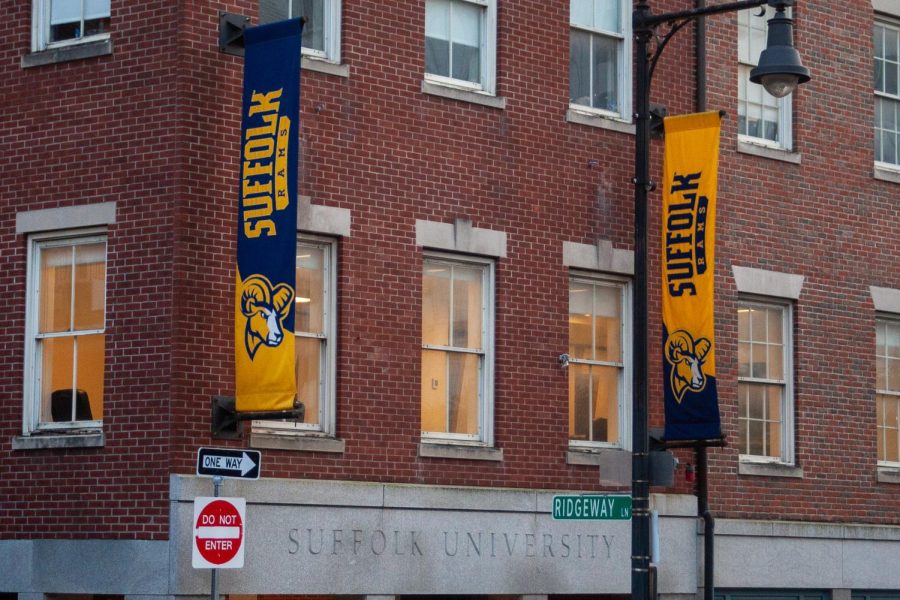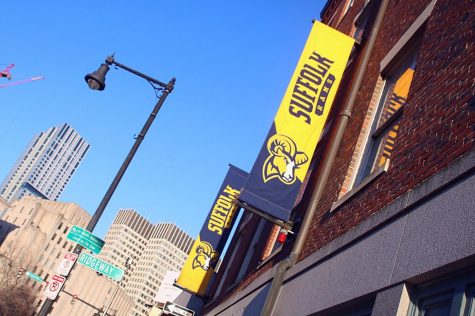Your donation will support the student journalists of Suffolk University. Your contribution will allow us to cover our annual website hosting costs.
The Ridgeway building, which houses Suffolk Athletics.
Suffolk Athletics addressing diversity issues, athletic director says
November 3, 2021
Suffolk University Athletics Director Cary McConnell said his department is working toward being more diverse and inclusive.
The changes come after The Suffolk Journal released an investigation in April about diversity and discrimination concerns from student-athletes of color.
The Journal investigation found that between the 2008-09 and 2020-21 seasons, about only 1-2% of students on the women’s basketball team were people of color, compared with an estimated 12-52% on other Division III women’s basketball teams in Boston.
Samari Winklaar, a former Division II player, was recruited by women’s basketball Head Coach Ed Leyden to play during the 2018-19 season. She told The Journal she encountered discriminatory comments during her time in the program, and that she was cut by Leyden after one season.
As The Journal later found, and is the case in other Division III universities, most student athletes at Suffolk were white.
“If you looked at the numbers this year, the recruiting numbers were very good in terms of diversity [in race, gender identity or sexual orientation]. We rose 19% in terms of applications, and then also in terms of deposits, we went up 59%,” McConnell said. “That’s a good trend.”
In a review of the team’s roster for this fall, The Journal could not identify any current players of color.
The number of student athletes from diverse communities has risen in the department as a whole, however. During the 2020-21 academic year, 74% of student-athletes and 49% of undergraduate students at Suffolk were white. This year, 71% of student-athletes and 50% of undergraduate students are white, according to data provided by Suffolk spokesman Greg Gatlin.
While the department has become slightly more diverse, McConnell said there is still work to do.
“Obviously, [the] article stung, but it was a good article,” McConnell said in an interview with The Journal on Friday. “I think it motivated us. We were on the path to addressing some of these issues, but I think it pushed us a little bit.”
McConnell said the department is “tackling” the issues in four ways: education, recruitment, hiring and retention.
In May, the department started the six-month program Return on Inclusion, a sports-specific education platform created to help organizations like Suffolk Athletics foster inclusivity through their cultures and leadership.
Each month, athletics staff took part in hour-and-a-half-long modules they later discussed together as a staff, McConnell said.
These modules covered diversity, inclusion and belonging, cultural competence, overcoming bias in decoding microaggressions, unpacking racism, anti-racism and privilege, LGBTQ+ inclusion and gender stereotypes, and concluded last month with a module on inclusive leadership, according to McConnell said.
The department also participated in the virtual New England Black Student Athlete Summit this summer, hosted by the University of Massachusetts, which focused on the experiences of student-athletes of color, McConnell said.
McConnell said Leyden, who remains head coach of the women’s basketball team, participated in the diversity and inclusion training. He also attended the Black Student Athlete Summit.
“I can’t really speak to personnel issues with coach Leyden, but I will say he is committed … like the rest of the staff is here in athletics in terms of mirroring the values of the university,” said McConnell.
Education around diversity, equity and inclusion will continue in the department, McConnell said.
“It’s not something we’re just going to do and then wash our hands,” McConnell said. “What we want to do is keep educating, keep it in the forefront so it seeps into our programs and becomes a part of what our athletic teams are, because the next piece in the way we’re attacking it is recruiting.”
It’s not something we’re just going to do and then wash our hands. What we want to do is keep educating, keep it in the forefront so it seeps into our programs and becomes a part of what our athletic teams are.
— Athletics Director Cary McConnell
McConnell said coaches watch games and showcase tournaments across the country to recruit new players for Suffolk — one of the biggest jobs the coaches have each year.
“Given that our diversity numbers weren’t where we wanted them to be, [coaches] have changed where they go, the showcases they go to, to try to find a pool of diverse student athletes to recruit,” he said.
Recruiting diverse players is not an issue just at Suffolk, however.
About 74% of student-athletes in Division III identify as white compared to the 56% white student-athletes in Division I and 58% in Division II, according to the NCAA.
“I think [the lack of diversity] probably speaks volumes to the inequalities in the US in terms of socio-economics, educational opportunities and the huge rise of pay for play,” McConnell said.
About 90% of student athletes at Suffolk have played on high-level travel teams before coming to the university, which can cost anywhere from a few thousand dollars to $20,000 a year, McConnell said.
“Whether we have to change it up and spend a little extra money, we have to find more diverse student athletes,” he said. “We also don’t want to get them here and then lose them.”
Athletics is starting an inclusion coalition of student-athletes, athletics staff and campus partners to focus on diversity, equity and inclusion in the department, McConnell said.
The coalition would be student-led and work on developing inclusive leaders. It would partner with other people at Suffolk and in the area on issues related to diversity, equity and inclusion, along with elevating voices and experiences of underrepresented student athletes. It would also provide input on new policy adoption in the department, according to a proposal for the coalition.
The coalition would also “provide feedback, goals and suggestions to Athletics’ administration on how to improve inclusivity in the department,” the proposal said.
McConnell hopes the coalition will start up in February or March.
The department is also re-evaluating its hiring process to eliminate any racial bias within it. Athletics administration is reassessing the language used in its job postings to make sure it is inclusive, and is sharing these openings on more websites, McConnell said. This includes the NCAA website.
“[The NCAA] is linked up with a bunch of different hiring sites where you can attract diverse candidates, so that costs extra money and we paid that to try to attract some diversity in our pool,” McConnell said.
The NCAA reported that in 2020, 91% of Division III athletic directors were white and 90% of head coaches in the division were white. Meanwhile, 78% of athletic directors and 80% of head coaches in Division I were white, while 84% of athletics directors and 81% of head coaches in Division II were white.
McConnell hopes that diversity among Suffolk Athletics’ coaches and staff will improve with the department’s new initiatives.
“We’re fully committed to making this happen,” McConnell said. “I think we’re on the right path. I’m not saying we’re perfect. We have work to do, but I think we’re trending in the right direction and we’re committed to doing the work.”
Winklaar said she is encouraged by the changes the department is making and that she is “grateful that the athletic department is recognizing the issues within the program.”
Anybody who comes into these teams with a little bit of color needs to feel comfortable.
— Samari Winklaar
“Anybody who comes into these teams with a little bit of color needs to feel comfortable,” Winklaar said. “I don’t feel comfortable going into a team where the people around me don’t look like me. I’m not going to feel comfortable coming to the team if it’s not welcoming — if there’s racial slurs still being spoken.”
She added that despite her experience on the team, she is grateful for the skills she took from her time on it.
“I’m not upset at anyone in the department,” Winklaar said. “I’m actually very grateful for the opportunity that Leyden gave me to start off with, and the help that he gave me. I’m grateful for those things, but I do want change. I do want action.”




